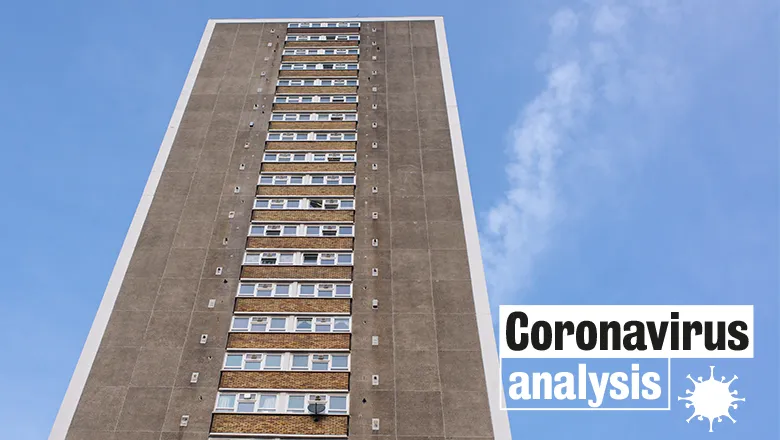10 April 2020
The coronavirus response shows we can solve the UK's housing crisis
Rebecca Benson
REBECCA BENSON: Many of the government’s measures are long overdue

Covid-19 has spurred the government to take actions on the housing crisis that advocates in the sector have been demanding for years. The link between Local Housing Allowance (LHA) and local rental prices has been re-established, and out-of-work benefits such as universal credit have increased. While these are welcome changes, there remain too many households whose accommodation threatens their health and wellbeing.
In the midst of lockdown, this is starkly highlighted by the 5,400 households in emergency accommodation in B&Bs or hostels. Such housing places families in a single room, sharing bathroom and cooking facilities with strangers. Social distancing is not possible in these circumstances. School and playgrounds can no longer provide respite to children who will be confined to a single room with their families for hours on end.
Of course, the reality is that even before the pandemic, poor housing was already damaging people’s physical and mental health. Research by Shelter published in 2015 found that half of parents in B&B accommodation reported their children’s physical health had been affected by the accommodation. A survey found that among adults in the private rental sector, worries about housing caused about a third to lose sleep, about a quarter to feel physically ill, about a third to feel hopeless, and nearly half to feel stressed or anxious. In 2019, the English Housing Survey found 10.9 per cent of homes did not meet minimum standards to be considered “decent”, rising to 14.2 per cent in the private rental sector. Older adults are especially likely to be living in non-decent homes, with one in five homes headed by someone over 75 not meeting this standard.
The housing crisis, with millions of households in unaffordable, insecure, and unsafe housing, and rough sleeping becoming increasingly visible, is not new. The combination of rising prices in the private rental sector, insecure and low paying work, cuts to benefits, and reducing social housing stock through Right to Buy have all had an impact over the past decade. What the pandemic response makes clear is that this was always a political choice.
This government was elected with a commitment to eliminate rough sleeping within five years, but it now sees rough sleeping as a problem to be solved within a much shorter timeframe, having given local authorities just four days to house all rough sleepers by the last weekend in March.
Research by Crisis and the Chartered Institute of Housing showed that 97 per cent of local areas in England were unaffordable for households receiving housing benefit, and charities and others have been consistent in calling for an end to the freeze on LHA. While the rate was set to increase by inflation in April this year, it took the current extraordinary circumstances for the rate to be linked to actual rents.
One of the primary justifications for benefit cuts and other reductions in funding that contributed to the homelessness crisis has been that to provide adequate funding would be unaffordable. Yet the cost of providing emergency and temporary accommodation increased by 78 per cent over five years, so that in the year ending April 2019 local authorities in England had spent £1.1 billion. Moreover, there are other public costs incurred, including £1.4 billion to the NHS from health issues arising from substandard housing.
The short-sightedness of this approach has been exposed by this pandemic. The public may have been inured to how poor a system relying on a hodgepodge of unsuitable temporary accommodation providers had become, but news that Travelodge evicted families housed in its hotels by local authorities should make clear that something has gone very wrong.
Many of the government’s responses to the current pandemic are long overdue in the context of a decade-long housing crisis, and have given the lie to the myth that taking steps to address the crisis is impossible or unaffordable.
The pandemic reminds us that the housing crisis isn’t just harming those who experience the worst housing conditions. Even if many can practice social distancing in comfort, sub-standard housing slows our ability to control the coronavirus in the immediate term, and in the longer term places greater demand on the NHS while also limiting opportunities and the contributions people can make to our society. Enlightened self-interest dictates that even after the pandemic crisis is resolved, ensuring that everyone has access to an affordable, secure, and safe home should be prioritised by government.
Dr Rebecca Benson is a Research Fellow at the Policy Institute, King’s College London.
